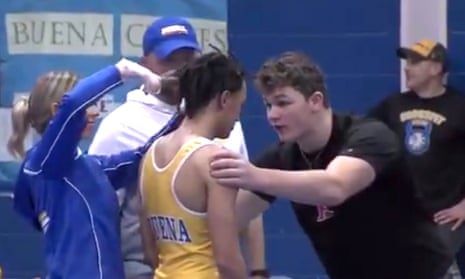New York City will ban discrimination based on hairstyles, a rule designed to stop policies that penalize black people.
The New York City commission on human rights issued the new regulations on Monday. Believed to be the first in the US, the rules give African American New Yorkers the legal right to wear their hair in afros, cornrows, locks, twists, braids, Bantu knots and other styles.
The guidelines target grooming policies maintained by some employers and schools that prohibit hairstyles such as dreadlocks. In December, across the Hudson river in New Jersey, a high school wrestler was forced to cut his hair before competing, an incident that sparked outrage.
“Bans or restrictions on natural hair or hairstyles associated with black people are often rooted in white standards of appearance and perpetuate racist stereotypes that black hairstyles are unprofessional,” the commission guidelines state.
“There is a widespread and fundamentally racist belief that black hairstyles are not suited for formal settings, and may be unhygienic, messy, disruptive, or unkempt.”
In 2016, a federal court ruled that it was legal for an Alabama company to rescind a job offer from a woman who refused to cut her dreadlocks.
The New York commission in contrast enforces far-reaching anti-discrimination rules within the city, including sanctions on businesses and landlords that persistently refuse to use a transgender person’s preferred pronouns.
The latest regulation protects all hairstyles closely associated with a person’s racial, ethnic or cultural identity. But it explicitly spells out that it protects black people’s right to maintain natural hair. Infringements will be considered illegal racial discrimination and businesses will face fines of up to $250,000 for violations found to be malicious.
Employers may not require workers to straighten or relax their hair, the policy says. Grooming policies that ban hair that extends a certain number of inches from the scalp are also forbidden, since they would prohibit afros.
Businesses are prohibited from discriminating against would-be customers. A nightclub, for example, will not be able to enforce a dress code banning certain hairstyles.
In 2017, the US army lifted a ban on servicewomen wearing their hair in locks.
The New York guidelines will not affect rules that require all workers to wear hair nets or keep their hair tied back for health or safety reasons.
The human rights commissioner, Carmelyn Malalis, posted on Twitter a photo of Barack Obama bending down to allow a young black boy to touch his hair.
“Hair is a part of you,” she wrote. “Race discrimination based on hair is illegal in NYC.”
